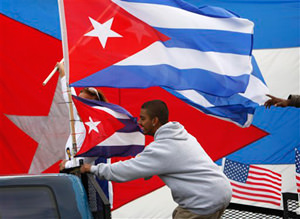A Changing Community Now Wants Softer U.S. Policy on Cuba
A majority of Florida's Cuban-Americans, including many former hard-liners, have come to oppose a U.S. embargo strategy that has proved futile over the decades.
Patty Khuly couldn’t believe the news when she learned that her uncle had been killed when his airplane was shot down by the Cuban air force. It was Feb. 24, 1996, and Cuban MIG-29 fighters had just killed four pilots flying two small planes for the organization Brothers to the Rescue.
Khuly was a university student in Philadelphia on that fateful day. Volunteer pilot Armando Alejandre Jr. was her uncle. She immediately flew to Miami. “We’re a very close family,” she says. “This was so devastating.”
Brothers to the Rescue had been flying humanitarian missions to rescue rafters fleeing Cuba, according to group leaders. Shooting down the unarmed planes was murder, they said. The Cuban government pointed out that it had warned the United States to stop the group from dropping propaganda leaflets over Havana and otherwise violating Cuban airspace. It argued that downing the planes was legitimate self-defense and that the blame for their deaths lay with the U.S.
Within a matter of weeks, President Clinton agreed to sign the Helms-Burton bill , a stringent tightening of the U.S. economic embargo against Cuba. The law was aimed in part at preventing foreign businesses from investing in Cuba, and it expanded the right to sue some foreign companies doing business in Cuba. These were unprecedented measures under international law.
Khuly stood behind President Clinton during the Helms-Burton signing ceremony and received one of the pens he used. Today she is a prominent veterinarian in Miami and a proud member of the Cuban-American community there. But she has changed her mind about Helms-Burton and U.S. Cuba policy in general.
“In retrospect, Helms-Burton is one of the silliest pieces of legislation,” she told me in her first press interview. “It’s one of these ‘big stick’ laws that do nothing but get the rest of the world angry at us.”
Khuly represents the changing views of many young Cuban-Americans. Today 55 percent of Cubans living in Florida oppose the U.S. embargo, according to a Florida International University poll.
Pepe Hernandez, president of the Cuban American National Foundation, a key anti-Castro group, has joined with others to sign a Brookings Institution call for the U.S. government to lift the U.S. embargo and normalize diplomatic relations with Cuba. Taking such a stand 10 years ago would have invited death threats or even assassination, but today this view is often heard among Cuban-Americans.
Cubans who immigrated to the U.S. in the early 1960s tend to hold hard-line views against the Castro government and favor a stringent U.S. embargo. Those who arrived after the 1980 Mariel boatlift tend to have family members in Cuba and want to send money to their relatives there and visit the island. Cubans born in the U.S. also are likely to take a moderate approach.
Inhabitants of Cuba receive an estimated $1.25 billion per year in remittances from abroad, about half from Cuban-Americans. An estimated 150,000 Americans visit Cuba every year. Many of them are Cuban-Americans traveling legally on emergency family visits; others travel illegally through Mexico or Canada.
Khuly blames both Democrats and Republicans for the failed policy. The Clinton administration, she says, used her and her family after the death of her uncle. “The administration wanted to make the Cuban-American population happy here in Miami.”
President George W. Bush tightened sanctions even further by declaring that Cuban-Americans could send no more than $1,200 per year to relatives on the island and by restricting family visits to once every three years. His administration refused to allow virtually all Cuban musicians, artists and academics to visit the U.S.
“All that was pandering to the Republican base,” said Khuly. “I don’t believe Bush cares that much about Cuba.”
The U.S. embargo has failed to change Cuba’s policies and is ignored by every other country in the world. In 2008 the U.N. General Assembly voted 185-3 to condemn the embargo. President Obama and Secretary of State Hillary Clinton have promised to lift restrictions on Cuban-American remittances and family visits. The State Department has ordered a major review of Cuba policy.
Bill Delahunt (D-Mass.) and Jeff Flake (R-Ariz.) have introduced legislation in the House of Representatives to lift the ban on all American travel to Cuba. In late February, Sen. Richard Lugar (R-Ind.), the ranking Republican on the Senate Foreign Relations Committee, issued a position paper calling the embargo a “failure” and asking Obama to change U.S. policy toward the island.
Khuly and many other Cuban-Americans maintain their strong opposition to the Castro brothers’ rule in Cuba and condemn their human rights violations, but they argue it’s time to admit that the embargo has been counterproductive.
I asked Khuly what she would tell President Obama if she met with him as she had with President Clinton. She replied she would tell him that Cuba would benefit if more Americans visited the island, opening Cubans to new ideas.
“Cuba needs to have as much influence from the outside as possible,” she said. “The embargo needs to die as quick a death as possible.”
|
Reese Erlich is a freelance foreign correspondent and author of the recently published book “Dateline Havana: The Real Story of U.S. Policy and the Future of Cuba” (Polipoint Press, 2009). |
Independent journalism is under threat and overshadowed by heavily funded mainstream media.
You can help level the playing field. Become a member.
Your tax-deductible contribution keeps us digging beneath the headlines to give you thought-provoking, investigative reporting and analysis that unearths what's really happening- without compromise.
Give today to support our courageous, independent journalists.






You need to be a supporter to comment.
There are currently no responses to this article.
Be the first to respond.